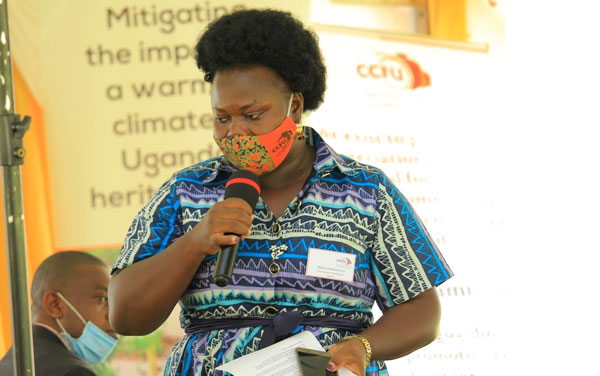
The IK after thought?
Samuel Okene Ayaru works among another minority group; the Ik in Kaabong and the Soohoo. He works with the North Karamoja Indigenous Minority Platform. He says the biggest challenge the minorities in the Karamoja sub-region face is distance between the communities and the schools. He says most of the schools are poorly staffed and the teachers posted in these schools hardly understand the language of the indigenous minority groups.
“In every parish, there should be a primary school and a secondary school in every sub-county but that is not the case in Karamoja sub-region. When it comes to instruction of students, most of the qualified teachers posted there, they are not understood,” Ayaru says.
“Are we part of this country or we are simply an appendage and an afterthought?” he says.
He says health centres are as far away as 30-60km from the communities and they lack drugs and medical equipment. He says lower level units which are nearer cannot support health services like delivery of mothers. Most people go to bigger faith-based health facilities; St. Joseph in Kitgum and St. Kizito, Matany in Napak District.
Lackluster response
The government has in place several legal framework and policies to promote and protect the rights to education and health services in Uganda. The Uganda Human Rights Commission (UHCR), the Equal Opportunities Commission, and courts provide avenues for redress.
The Uganda Constitution also provides for the integration of Uganda’s minority communities into development programmes under Article 36 and the right to a clean and healthy environment under Article 39.
It also protects for their children’s rights under Article 34, the disabled people under Article 35, the right to equality and non-discrimination Article 27 and Article 30 of the Constitution concretizes the right to education for every Ugandan and Article 33 also provides for the protection of women’s tights.
Other laws aimed at equality include; the Equal Opportunity Act, 2007 also provides for addressing inequalities across Uganda’s regions and communities. The National Land Policy, 2013, recognises the marginalisation and land injustice the ethnic minority and pastoralist communities face and directs the government to take measures to improve their land rights.
But, Sylivia Kokunda, the executive director of Action for Batwa Empowerment Group (ABEG), a local community organization based in Kanungu District told The Independent recently that, “The people in government only stop at giving her people words and no action.”
Action needed
Barbra Babweteera, the executive director of the Cross Cultural Foundation of Uganda (CCFU), a Kampala-based non-profit that promotes the appreciation of Uganda’s cultural identity and diversity says indigenous minority groups in Uganda generally lack political representation right from the village level and this has been the genesis of their problems.
She says if the government continues to neglect Uganda’s ethnic minorities; the country will eventually lose a big chunk of its ethnic heritage.
“Uganda is known around the world as one of the most ethnically diverse countries. It is one of the factors that the tourism sector has started tapping into nowadays,” she said. Going forward, Babweteera says it is time the government fixed the Constitution’s schedule which describes who is and who is not Ugandan.
“Can we have the Benet, the Bagabo, the Bakindwe and the Maragoli and all those who have been in Uganda for all the years get recognised as bonafide indigenous groups,”she says.
“We would also like to see these communities, whose populations constitute the poorest of the poor communities in Uganda deliberately planned for in order to help them access basic services,”she says, “Just making these people complete at least secondary school would go a long way in breaking the cycle of poverty.”
****
 The Independent Uganda: You get the Truth we Pay the Price
The Independent Uganda: You get the Truth we Pay the Price


